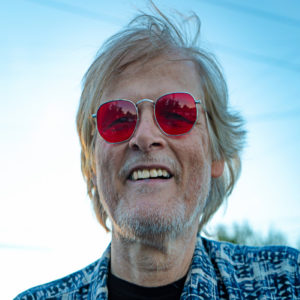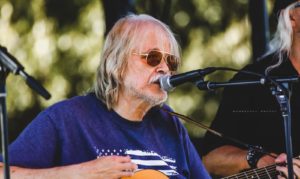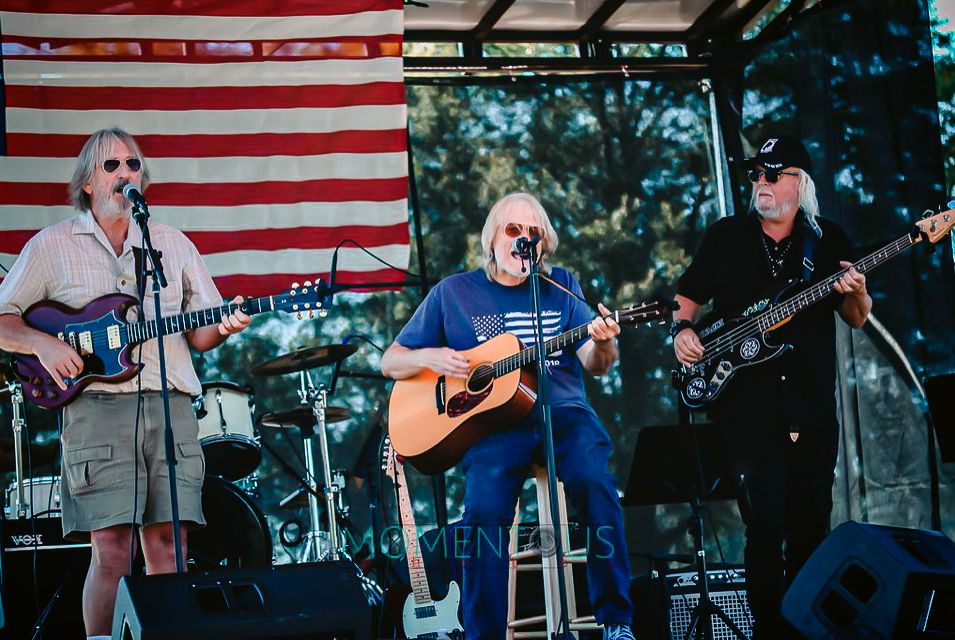Terry Bell couldn’t stop writing music if he tried.
Raised in North Dakota (hey, neighbor!), Terry’s decades-long music career led him to the West Coast, East Coast, and ultimately Nashville, where he worked with industry icon Ron Cornelius and artists like Tracy Lawrence and Michael Grimm as they were just getting their start. Still based in Music City, Terry has been steadily writing and recording original songs there ever since.
In this interview, Terry shares the wild story arc of his career, peppering in lots of insights about the power of music to touch people’s lives. He also shared some endearing stories about how an old re-run of Touched by an Angel inspired one of his recent songs and how a bout of COVID-19 gave that song even more meaning.
Follow Terry’s journey by visiting his website or liking his Facebook page. You can also find him on Spotify and YouTube.
Background
 Alma Cook: Thanks for joining us for this interview, Terry! What’s your origin story? With 30 years of music experience under your belt, how did you become the musician you are today?
Alma Cook: Thanks for joining us for this interview, Terry! What’s your origin story? With 30 years of music experience under your belt, how did you become the musician you are today?
Terry Bell: I discovered at a very young age that I was born with a natural, God-given talent to sing and play music. I’ve always had a strong desire to learn, grow, and develop those talents, and I still feel that after 30+ years I’m learning and growing and haven’t reached the full potential of who I was called to be when that dream was planted in me as a kid growing up in Grand Forks, North Dakota.
I got my first taste of performing live at 5 years old, singing my first solo for a local radio program that was being broadcast from my church. My mom got my first acoustic guitar when I was 12, a Stella that she got from saving S&H Green Stamps. I loved that guitar. When I was 14, my mom bought me my first electric—a Kent—and a Fender amp so I could play music in a new band I was putting together with some friends from high school. We called ourselves the Night Riders after our favorite band, Paul Revere and the Raiders. I was growing and learning new songs, and I was hungry to get out and perform.
I would spend most of my time in my room listening to music and trying to figure out how to play the chords and guitar licks being played by the Beatles and other bands I loved to listen to in my early teens growing up in the 60s—not just rock, but pop, R&B, blues. Folk rock had a big influence on me as a musician and the melodies I write, especially Paul McCartney and other pop and folk rock songwriters like James Taylor and of course the Eagles and Tom Petty.
They say that personal experience is the best teacher, and for me, that’s true. Since I left home at 18, I’ve played coffee houses and bars in the San Francisco Bay area, been a street musician on Fisherman’s Wharf, and played at the Catalyst in Santa Cruz. I’ve been fortunate to open up shows and share the stage with artists like Robert Cray, Elvin Bishop, Country Joe and the Fish, Steppenwolf, Head East, David La Flame, and David Bromberg when I was playing with a 70s country rock band called Dakotah.
After I left the band in ‘80, I moved to New York and lived with a friend who had a place in the Long Island/Westbury area. I would pitch my songs to the labels in the city, and at night I played music in the clubs, open mics, and restaurants. I got a gig as a regular performer at the Rusty Scupper and was a featured songwriter at Strawberry’s and Hofstra University, and I performed regularly at My Fathers Place, where Billy Joel got his start.
AC: This is the kind of story you see played out in the movies—the starving artist playing bars and clubs in New York. Was it after that that you moved to Nashville and started getting into the behind-the-scenes side of things?
TB: I moved to Nashville in ’88 and continued to hone my songwriting craft and performing skills, learning how to write great songs from some of the best songwriters on music row. I was at the right place at the right time, meeting up and coming artists like Tracy Lawrence, with whom I co-wrote some of the first songs that he performed at his Bluebird Café showcase. I was blessed to get to work with songwriters who went on to write some big hits for country artists during the 80s and 90s.
I’ve played a behind-the-scenes role for quite a few years working with Ron Cornelius—music row producer and music publisher, owner of the Cornelius Companies and Gateway Entertainment Inc.—in talent scouting, music publishing, and licensing for his record label. I’ve had four #10 singles, two #1s, and a Top 40 song, mainly with independent country artists and in the Positive Christian Country radio format, including Michael Grimm, who had a hit with my country gospel song, “John Wayne and Jesus.” The song helped launch his career, and he went on to win America’s Got Talent in 2010. My last single, “She’s Got a Heart Like Mine,” landed in the top 5 on the Independent Music Network, made it onto the Top 30 Country Charts, and was nominated for a Breakout Country Single Award in 2019. My new song “Find the Stars,” was #1 in the Independent Music Network Country Charts this last spring.
All of the great experiences I’ve had working as a musician and songwriter these past 30+ years have helped to shape me—the opportunities I was given to work with music icons like Ron Cornelius, top studio musicians, and songwriters, learning from them and applying what I learned to get better at my craft. It’s not been an easy road—I’ve paid my dues, hearing all the no’s and seeing all the doors that didn’t open for me—but it strengthened my faith. My determination not to quit or give up has formed my character and made me the man and musician I am today.
It’s not been an easy road—I’ve paid my dues, hearing all the no’s and seeing all the doors that didn’t open for me—but it strengthened my faith. My determination not to quit or give up has formed my character and made me the man and musician I am today.
Terry Bell Tweet
AC: So while your music career was developing, what shaped your politics into what they are today? Were there any key personal experiences that played a role?
TB: To be honest, I try to keep my political views in line with who I am and what I believe as a Christian. As I have gotten older and more mature, I have become more moral and ethical in the personal and business decisions, and my political views have become more conservative. I don’t let the media, political parties, or public opinion influence how I vote for candidates or issues that I care about—so I guess that makes me an independent as far as my politics go.
Deep Dive
AC: Tell us about your songwriting process! Where do you draw your inspiration when making a new work?
TB: I love the songwriting process—taking an idea or thought and creating a beautiful melody and story that people can relate to and touch their hearts and emotions. I try to write songs that have meaning and a universal message to offer hope and encouragement. A great song can make you smile, cry, dance, and inspire you.
A lot of my best song ideas have come from conversations people have had around me, or from watching a great movie or TV show that had a line or phrase that caught my attention. Nashville songwriters are great at turning a phrase and looking at it from a different viewpoint—I love to do that too. I have written a lot of my songs coming up with a new way of looking at an idea or thought and building a story around the phrase or idea. That’s the great thing about being a songwriter: we are able to stay open to ideas that come across our paths that other people might have but can’t communicate. Songwriters can bring it out of the hearts and minds of others so that when people hear it, they can relate to the idea because they can see themselves in the story that is being told.
AC: What inspired your most recent song, “Find the Stars”? What is the significance for you of finding the stars in the darkness?
TB: I’m a big fan of the TV series Touched by an Angel. I was watching an old rerun one night, and there was a conversation between the two angels, Tess and Monica. Monica was asking Tess what people do when they are walking through darkness, and Tess said, “Find the stars.”
When I heard that, I thought—wow! What a great idea. It inspired me so much, I started thinking about writing a song about finding the stars.
I had a cool melody and some lines and thoughts on the song idea, and I decided to contact Maggie Harris, a good friend of mine who I had been writing with. She loved the idea, too, so we started brainstorming and working on it together. I recorded it in a Nashville studio with some awesome musicians and studio engineers in June during the citywide COVID-19 lockdown.
The song was released in September 2020. I got COVID-19 and pneumonia right after Christmas, and I ended up very sick in the ICU. The meaning of the song became much more personal to me when I started thinking about all of the my friends calling to check on me and to tell me they were praying for me and loved and cared about me. It helped me to realize that I was not alone—even though I felt that like sometimes—especially when I was feeling fearful, weak, and my faith wasn’t strong. I believe that God was with me and that he sent nurses, doctors, and friends to give me the words of hope and encouragement that I needed to hear to keep me going.
To me the song is not about finding the stars in the sky but looking for the stars in our lives: our friends, family, children, and loved ones who are there to brighten our lives. Especially in the dark and difficult times we go through in life, they shine bright like the stars in the sky.
We are all going through challenging times these days, and I think songs with a positive message can bring hope and encouragement to people looking for something to make them feel better—that’s what good music is all about.
I know the song had a positive impact from the response from the music reviews I got and the people that heard it and commented on how it encouraged them. The single hit #1 in the Independent Music Network Top 30 Country charts in April on my birthday, which confirmed to me that I need to keep writing more songs to bring light into dark times.
'Find the Stars' was released in September 2020. I got COVID-19 and pneumonia right after Christmas, and I ended up in the ICU. The meaning of the song became much more personal to me when I started thinking about all of the my friends who were calling to check on me. I realized that I was not alone.
Terry Bell Tweet
AC: In “She’s Got a Heart like Mine,” you sing about knowing what’s on the inside despite what is vocalized or outwardly obvious. How might this sort of reflection and intimate connection help those seeking to overcome the political divide?
Everybody has a right to express their own opinions and beliefs where we seem to get into trouble. In my opinion, it is only seeing one side of a political issue that is causing division in our country and in our relationships with each other.
Quick Takes
 AC: Time for quick takes! What do you think is music’s role in political or social movements?
AC: Time for quick takes! What do you think is music’s role in political or social movements?
TB: I believe music can be used for good purposes, and depending on the message or theme of the song it can affect our culture and society positively or negatively, especially if the lyrics or tone of the music is dark with violent images. But if the mood of the song is uplifting, it can bring hope and inspire people to do great things in life and contribute to the betterment of society because of this simple truth: what we see, hear, and watch becomes a part of us and shapes who we are and how we interact with the world.
As far as music’s role in the political movement, the message or theme of the song can tie in to a political party’s platform or campaign. That’s why they have country or well-known pop artists performing at the political conventions; music is a huge draw to get people fired up and motivated.
Lee Greenwood’s “God Bless the USA” is a good example of that.
AC: Would you ever stop listening to an artist because you disagreed with them?
TB: No, of course not. For me, if I’m into an artist’s music, it’s because I love the songs they sing and perform. I don’t stop listening to them because I disagree with their personal views on something.
What's Next?
AC: Great conversation, Terry. So what’s around the corner for you? Anything new we can expect from you artistically in the coming months?
TB: Yes, as a matter of fact, I have been working on some new music and updating some older songs no one has heard before. I’m planning to release my next single, “That Man Looked Like Jesus,” sometime after the new year. It has a very cool Tom Petty rock sound and vibe and has a great universal message about being kind to each other. I’m also thinking about putting together an EP with my last 2 singles I’ve recorded and including some other songs I’ve written. As a songwriter and artist, I have a lot of different music styles and genres I love to write songs in and sing.
One thing you’ll learn about me is that I don’t want to be put in a particular slot or box. I like to mix it up with a variety styles from country, rock, folk, pop, and there is the singer songwriter side of me. I have a song I wrote called “Glass Heart” that has an early acoustic Eagles flavor and my song “Fathers Love” that has a James Taylor feel with cellos and strings. At some point I will be getting those out so people can hear them, so stay tuned—the best is yet to come.





